Air
Cargo Talks Volcano Too
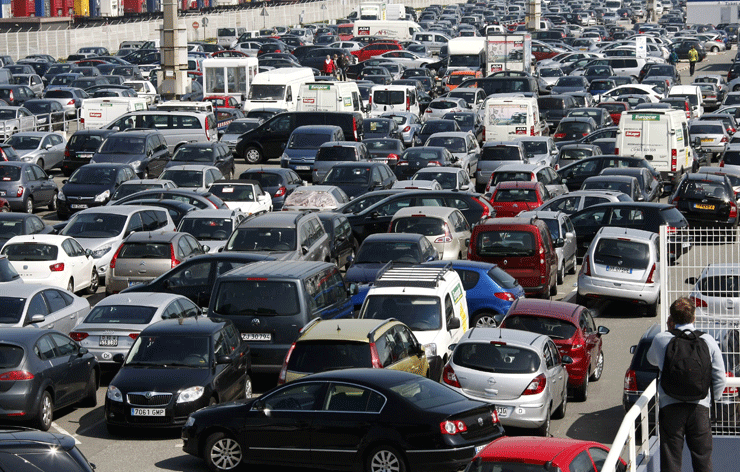
Cry Havoc… Cars in Calais as airports closed throughout
northern Europe last week. Scene was repeated in train stations
and elsewhere.
|
 Klaus
Holler, Lufthansa Cargo VP North America is the go-to executive for
the past years that has led a team of logistics professionals during
a major business surge in the USA Klaus
Holler, Lufthansa Cargo VP North America is the go-to executive for
the past years that has led a team of logistics professionals during
a major business surge in the USA
Put another way business has been absolutely
high, wide and handsome for the German national carrier here.
“Until the “cloud” hit
things were going pretty well,” Mr. Holler confirmed.
“Now we have to deal with some backlogs
that we are working at clearing,” he added.
“But what we take away from all
of this is that industry does not last very long without air cargo,
a fact the is perhaps wider understood now more than ever.
“We also must never forget that
after all is said and done Mother Nature rules this planet and we are
only guests here-each of us for a very short time.
“In any case it is good to be reminded
occasionally that all of us after all are just human.”
As to the rumored retirement of Mr. Holler
in 2010- we wonder how can he kick back and step down when biz is soaring
and he laughs:
“Well I was retiring and will retire
but right now am about finding my own replacement for this job.
“I expect if all goes well my plan
will be accomplished by September.”
But about that volcanic cloud Mr. Holler
says:
”There has to be a better plan in
place as has been suggested by many in Europe so that a computer model
of a cloud of ash cannot close down the entire system.”
As far as heroes, Klaus agrees that the
pilot who took up that MD-11F at the height of the grounding scare last
week and dispelled any doubt that the ash would affect operations is
high on his list of people he admires.
“Our Chief Pilot Fokko Doyen is
both courageous and also quite dedicated to helping others. He works
tirelessly for example as part of our health initiative Cargo Human
Care flying much needed medical supplies regularly into Africa.
“Cargo Human Care e.V. (CHC) is
a humanitarian and medical aid project, originating in the joint commitment
of Lufthansa Cargo employees together with medical doctors from all
over Germany.
“Core of all efforts is direct and
efficient medical aid for people in need as well as support for orphans
unable to sustain themselves.
“My view is that during this and
most crises air cargo has no shortage of dedicated people that want
to help others.”
Elsewhere Klaus Holler
notes LH Cargo commenced E-Freight out of the U.S.
Lufthansa Cargo has begun sending shipments
by E-Freight out of the USA. ACNFT was informed that the first
ever flown paperless commodity were spare parts for the aviation industry
flown on board of LH401 from JFK to FRA, April 15. Consignee was Lufthansa
Technik Logistik, the forwarding arm of LH Technik. Next
to come for E-Freight is the route ORD/FRA.
"The first E-Freight shipment from
the U.S. to Germany is a milestone for Lufthansa Cargo", Klaus
Holler said. "Fast and economic processes add value for everyone
involved.
“Moreover, we provide relief for
the environment through the saving of paper,” Herr Holler stated.
Klaus Holler
Vice President The Americas
Lufthansa Cargo
 “An
event like this brings into focus our vulnerability to unpredictable
natural forces that have the power to impact vast geographical
areas. “An
event like this brings into focus our vulnerability to unpredictable
natural forces that have the power to impact vast geographical
areas.
“In India, we have our share
of fog each year, but this is predictable and we have our contingency
plans for operations and diversions in place for the two winter
months, regardless of whether they occur or not.
“The disruptions caused by
the volcanic ash are a whole new experience for many of us.
“We are fortunately located
and our operations were not impacted.
“However, imports of aircraft
components and spares were greatly delayed, consequently affecting
any AOG situation or scheduled heavy maintenance checks.
“While seeking alternate routes
and air transportation substitutes are some solutions, the options
are limited for long distances.
“How does one truck aircraft
spares from Europe to India?
“Given our growing aviation
industry in India, perhaps it's time to look at setting up aircraft
spares and component manufacturing in India.
Tulsi N. Mirchandaney
Managing Director
Blue Dart Aviation Limited
|
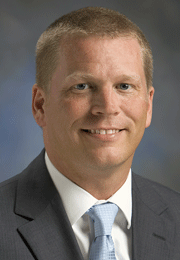 "What
we learned from the volcano" is a reinforcement of something
United Cargo learned long ago - the importance of having a solid
plan in advance of these events and executing the plan quickly
and precisely. "What
we learned from the volcano" is a reinforcement of something
United Cargo learned long ago - the importance of having a solid
plan in advance of these events and executing the plan quickly
and precisely.
“When the impact of the ash
clouds on European flights became known, cargo leadership met
to develop policies to minimize, as much as possible, the impact
of this event on our customers.
“When agreement was reached,
these policies were deployed to all field Operations and Sales.
Continuous dialogue between headquarters and the field throughout
the event is vital - to ensure policies are being consistently
applied and also to "tweak" the plan in response to
developing circumstances.
“The real key to the success
of this plan is immediate, constant and honest communication with
customers. We've learned it's impossible to over-communicate with
our customers in these situations - whether in published announcements,
e-mails or in personal contact via phone.
“These situations are always
in flux, and everyone involved is making critical decisions based
on available information.
“We believe telling our customers
what we know as soon as we know it benefits everyone.
“It's times like these that
also remind us of what great employees make up United Cargo.
“They all pulled together
and worked very hard on behalf of our customers to ensure they
were informed about what was happening, our plans for recovery
and executing that plan.
“Of course, we learn something
every time we go though a major schedule disruption: what we learned
from the Washington D.C. snowstorms in early February helped us
successfully manage this event, and what we learned from the ash
cloud event will improve our response to the next one.
“But we hope we won't have
to apply this any time soon."
Kyle Betterton
Vice President Cargo
United Airlines
|
 "The
volcanic ash cloud has shown once again how vulnerable our industry
is to external influences over which we have little or no control. "The
volcanic ash cloud has shown once again how vulnerable our industry
is to external influences over which we have little or no control.
“Our industry remains in a
fragile state and very susceptible to external influences (Volcano
disruption).
“Many business unable to move
product to retailers and end consumers.
“Supermarkets become short
of fresh produce.
“Just in time production hit
around the world - i.e. Nissan's Japanese production facility
closes its US vehicle production line due lack of parts from its
Belgian supplier
“The importance of air freight
in our everyday lives, and the global nature of the supply chain,
was illustrated by the volcano airspace shutdown.
“In just one week Miami will
become the focal point of the air cargo industry for three days
of Cargo Network Services 2010 Partnership Conference May 2-4.
“Of the 450 expected delegates,
one-third will be senior executives from the global airline cargo
industry, one-third will be senior executives from the U.S. and
International forwarding industry with the remaining third being
drawn from supply chain partners and suppliers.
“This is the most anticipated
event for the North American air cargo industry, and increasingly
recognized by participants drawn from around the globe.
"This 20th Partnership will
be the most important so far for our industry. Just as we were
starting to recover from the impact of the global financial crisis,
we have been reminded how unpredictable this business can be,
and how susceptible we are to external influences, with the airspace
closures following the Icelandic volcano eruption.
“Whilst we will certainly
allow ourselves a moment to reflect on the successes of the past
twenty years our focus will clearly remain on preparing the industry
for what lies ahead."
Michael Vorwerk
President
CNS
For more information
www.cnsc.net
|
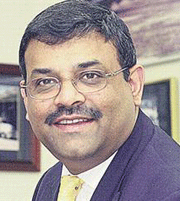 “Are
we prepared for the unexpected? “Are
we prepared for the unexpected?
“The recent volcanic activity
happening at a place which most of the people in the world can
hardly pronounce (!) brings home reality of the fact that the
21st century is going to be the most challenging century ever
. . . at least, the first few decades for sure!
“All we have got to do is
look at the number of challenges that we have had since the start
of this century.
“You bet ... never a dull
moment!
“The positive thing about
these challenges is that it separates the boys from the men!!
“This also calls for fresh
reform of the basis of decision-making capabilities.
“The next few weeks/months
will definitely be interesting to see what comes out the postmortem
of the airspace closure in Europe.
“The globalization and intertwining
of the world economies mean that anything happening anywhere in
the world, affects everybody, everywhere, in some shape or form.
“I agree with Bill Boesch
in that this highlights the importance of air travel and air cargo
services to commerce.”
Ram Menen
DVSP Emirates Sky Cargo
Dubai UAE
|
 “The
volcanic eruption is the most unfortunate thing that could have
happened to our industry. “The
volcanic eruption is the most unfortunate thing that could have
happened to our industry.
“As far as courier/express
operations from Chennai (in south India) are concerned, the shippers/courier
companies have tried all possible alternatives that they can do,
to surpass the route of ash.
“The shipments held up in
transit suffered since most consignors and consignees were not
aware of the volcanic impact, as it was sudden and acute.
“The few days when the routes
were closed turned out to be a real nightmare to the trade and
associated fraternities. “As routes and flights return to
normalcy, prioritizing the consignments is on top of our list.
“Regarding service level,
numerically it may be low but the way the trade coped with the
situation is really commendable: we rolled up our sleeves, pulled
up our socks and tightened our belts.
S Sakthivadivel
Managing Director
Esquire Express India
|
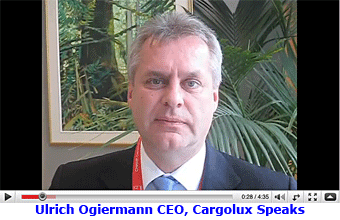 “The
crisis hit us and we had severe operational challenges. “The
crisis hit us and we had severe operational challenges.
“Now we are fully back on
track.
“Teams really show what they
are worth when they work under pressure: our guys were just fantastic!
“We had immediately set up
a 24-hr emergency room and all worked like clockwork.
“We had volunteers phoning
in offering their help, pilots standing by
voluntarily and so on.
“Europe as a whole at the
top level of coordination has to learn its lesson and be better
prepared and coordinated next time.”
Uli Ogiermann
CEO
Cargolux
|
 “When
the calamity struck, we put a plan into action which helped us
a great deal. “When
the calamity struck, we put a plan into action which helped us
a great deal.
“We started talking to the
civil aviation authorities at Athens to ensure a route through
Greece to the U.S.
“The kind of support we received
not only from the civil aviation authorities of Greece but also
our own in Delhi helped us over the crisis.
“At the height of the crisis,
we were able to operate 16 flights through Athens – and
we were the only Indian carrier to do so.
“While a number of our flights
were cancelled, we had no complaints from our shippers.
“They knew that the situation
was not in our hands but perhaps, more important, was the fact
that we were in touch daily.
“Communication is vital in
such situations and that helped us maintain our loads.
“We have not estimated our
losses yet but the crisis has taught us one lesson: never keep
facts hidden from consumers.
“Be frank and forthright –
always!
Jay Shelat
Vice President Cargo
Jet Airways
|
 “If
nothing else, the Iceland volcanic eruption should teach us one
thing: we should not tamper with nature. “If
nothing else, the Iceland volcanic eruption should teach us one
thing: we should not tamper with nature.
“If we do, we will have to
face the consequences.
“Often, we take nature for
granted and that is, perhaps, why we were caught unawares.
“Those of us related to the
aviation industry need to sit down and introspect and do our homework.
“Whenever a calamity occurs,
we make ad hoc arrangements and ride through the crisis.
“We never have a Plan B.
“In India, if such a calamity
were to take place, we would be in dire straits.
“The aircargo industry needs
to have a body which can have direct access to the government
agencies so that work does not stop.
“The volcanic ash crisis came
just about when the situation started looking good.
“We had gone through an aviation
strike and a prolonged period of bad weather in Europe.
“We certainly need to have
a Plan B.
“All our movement from India
stopped.
“Our clients understood the
situation and knew that it was beyond our control.
“Ultimately, who suffers?
“No one else but the consumer
– somebody has to pay for the delays and it is the consumer.
Shesh Kulkarni
President
UT Worldwide (India)
|
Tirthankar Ghosh/Geoffrey
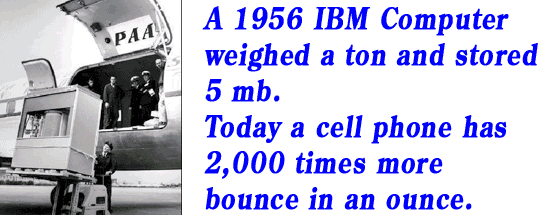
 “Yes,
it was necessary to close European airspace immediately after
the first layers of Iceland’s volcanic ashes penetrated
the continent’s airspace Thursday, April 15. “Yes,
it was necessary to close European airspace immediately after
the first layers of Iceland’s volcanic ashes penetrated
the continent’s airspace Thursday, April 15.
“No scientist, traffic
expert or politician was able to estimate or even accurately define
how harmful the drifting particles really were and what dangerous
influence they could have on air traffic. “Safety comes
first; this is a non-negotiable deciding factor.
“That’s why politicians
and administrators did right when they forbade airplanes to fly.
“The critical question
however is what happened after air traffic was halted by Eurocontrol
and national aviation administrations.
“Nothing much.
“Friday came and everybody
raised their heads to question whether there was substantiation
of the volcanic cloud floating somewhere in the sky.
“Irritatingly, no ash-spotter
between Scandinavia and Switzerland reported having seen anything.
“Then the weekend approached
with government offices closed and most politicians privatizing.
“That meant that the
standstill at the airports was worsened by a 48-hour weekend delay.
“Politics resulted in
a lousy crisis management.
“Questions to officials
by media airlines and airports about what precise facts and figures
the imposed flight ban was based on, were answered by pointing
at computer simulations of ash concentrations issued by the UK-based
Volcanic Ash Advisory Centre.
“It was at this stage
the only source to provide information for the national authorities’
decision to maintain their flight ban.
“A scandalous situation
proving the shortcoming of European politics.
“Meanwhile, millions
of passengers got stranded somewhere.
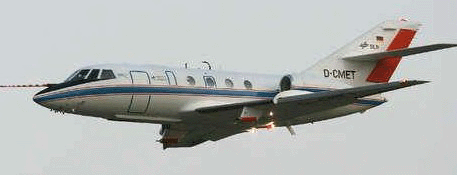 “Cargo
faced a similar fate with huge amounts of shipments piling up
at warehouses or standing at aprons. “Cargo
faced a similar fate with huge amounts of shipments piling up
at warehouses or standing at aprons.
“It took until Monday,
April 19, day four after the imposed ban on aviation, when finally
a Germany-based Falcon jet took to the air for a first survey
flight for evaluating the atmosphere and catch some of the floating
volcanic particles.
“The exact results by the
way are still kept under wraps.
“Since the cloud still
hung above Europe, the flight ban was prolonged by national authorities.
“There were exceptions.
Austria began allowing flying.
“So did the Czech Republic.
“All of a sudden the
European sky became again what it had been before the outbreak
of the volcano: a patchwork of areas and regions with no or only
poor central coordination.
“Now, what major lessons
are to be learned from the ash cloud that isolated almost a whole
continent for days:
“Firstly it badly needs
a single European sky.
“After discussing this
issue for over twenty years it’s about time to get rid of
the more than 30 air traffic control centers throughout the EU
that divide the sky like the landscape below. “Instead,
Eurocontrol should be given more responsibilities once and for
all to harmonize air traffic procedures under its umbrella.
“Thus, traffic coordination
would become much more efficient, processes would be streamlined
and intra-European flying enhanced.
“Besides it would save
fuel emissions and therefore reduce greenhouse gases.
“The second lesson the
EU member states together with Brussels should learn fast is the
need of stipulating limit values for volcanic ashes.
“Only after determining
these parameters, can authorities in collaboration with airlines
decide if flying is without risk or eventually becoming a danger
for passengers and crews.
“To achieve this knowledge,
scientific research of volcanic plumes must be intensified and
a program of turbine tests launched to find out which particles
in what concentration could harm the motors of aircraft and constitute
a danger for aviation.
“Thirdly airlines should
accept that volcanic eruptions are an act of god and refrain from
knocking at their government’s doors for getting subsidiaries
for lost business.
“IATA’s head Giovanni
Bisignani is not well advised telling airlines to apply for state
aid.
“This distorts competition
because some states might pay their carriers, others won’t.
“Then farmers, owners
of vineyards or fishermen should also be awarded taxpayer’s
money in case of heavy rain, draught or storm.
Heiner Siegmund
Heiner Siegmund is chief of Air Cargo New Flying Typers European
Bureau for the past several years.
Operating from Hamburg, Heiner has a unique grasp, perspective
and view straight from the heart of the logistics business in
Europe, but beyond that he is an exemplary news hawk that gets
the story.
|
|




 Klaus
Holler, Lufthansa Cargo VP North America is the go-to executive for
the past years that has led a team of logistics professionals during
a major business surge in the USA
Klaus
Holler, Lufthansa Cargo VP North America is the go-to executive for
the past years that has led a team of logistics professionals during
a major business surge in the USA  “An
event like this brings into focus our vulnerability to unpredictable
natural forces that have the power to impact vast geographical
areas.
“An
event like this brings into focus our vulnerability to unpredictable
natural forces that have the power to impact vast geographical
areas.  "What
we learned from the volcano" is a reinforcement of something
United Cargo learned long ago - the importance of having a solid
plan in advance of these events and executing the plan quickly
and precisely.
"What
we learned from the volcano" is a reinforcement of something
United Cargo learned long ago - the importance of having a solid
plan in advance of these events and executing the plan quickly
and precisely. "The
volcanic ash cloud has shown once again how vulnerable our industry
is to external influences over which we have little or no control.
"The
volcanic ash cloud has shown once again how vulnerable our industry
is to external influences over which we have little or no control. “Are
we prepared for the unexpected?
“Are
we prepared for the unexpected?  “The
volcanic eruption is the most unfortunate thing that could have
happened to our industry.
“The
volcanic eruption is the most unfortunate thing that could have
happened to our industry. 
 “When
the calamity struck, we put a plan into action which helped us
a great deal.
“When
the calamity struck, we put a plan into action which helped us
a great deal.  “If
nothing else, the Iceland volcanic eruption should teach us one
thing: we should not tamper with nature.
“If
nothing else, the Iceland volcanic eruption should teach us one
thing: we should not tamper with nature. 
 “Yes,
it was necessary to close European airspace immediately after
the first layers of Iceland’s volcanic ashes penetrated
the continent’s airspace Thursday, April 15.
“Yes,
it was necessary to close European airspace immediately after
the first layers of Iceland’s volcanic ashes penetrated
the continent’s airspace Thursday, April 15.  “Cargo
faced a similar fate with huge amounts of shipments piling up
at warehouses or standing at aprons.
“Cargo
faced a similar fate with huge amounts of shipments piling up
at warehouses or standing at aprons.

